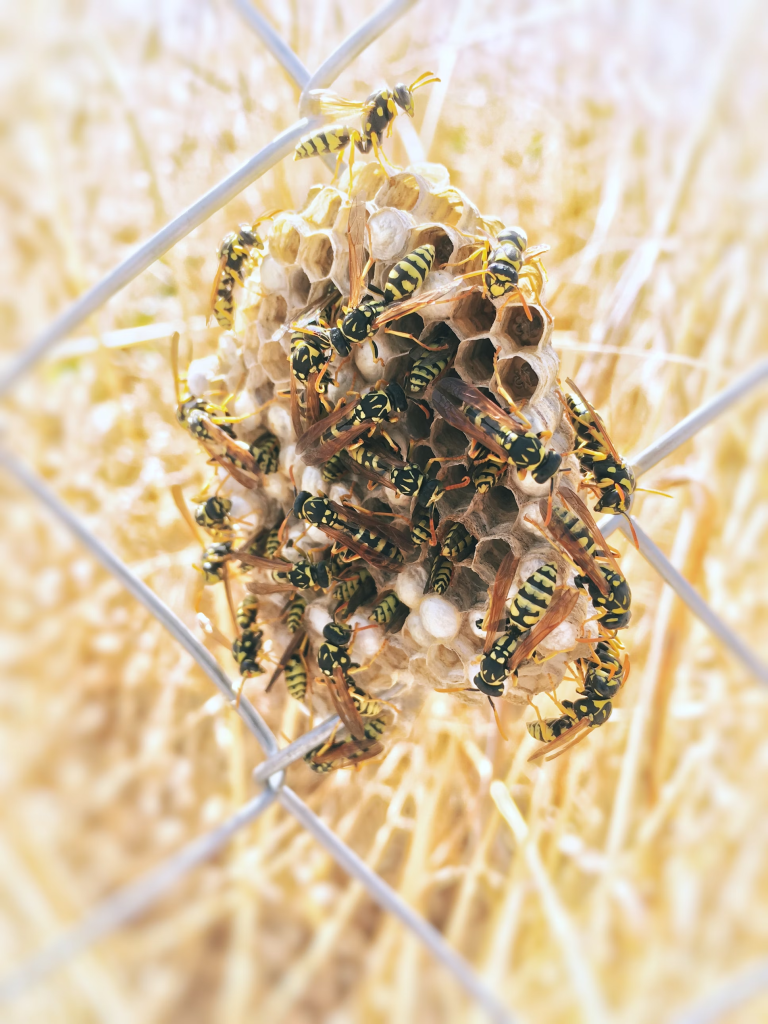In particular, during Melbourne’s warmer months, wasps may be a major pain and even dangerous. They are a nuisance in gardens and homes due to their aggressiveness and unpleasant stings. To have a comfortable and secure atmosphere, it is vital to know how to safely and successfully get rid of wasps.

If you’re looking for a way to get rid of wasps in Melbourne, this article has you covered with practical steps, safety tips, and preventative measures. Following these steps will help you quickly handle any infestation, no matter how big or little, and will also lessen the likelihood of recurrence problems.
How To Get Rid Of Wasps In Melbourne?
Getting rid of wasps can be challenging, but there are several effective methods you can use to deal with them in Melbourne. Here are some steps and tips:
Identify the Nest
- Locate the Nest: Wasps often build nests in sheltered areas such as under eaves, in trees, or inside wall cavities. Identifying the nest location is crucial for effective removal.
Safety Precautions
- Protective Clothing: Wear long sleeves, pants, gloves, and a hat to protect yourself from stings.
- Timing: The best time to approach a nest is at night or early morning when wasps are less active.
Removal Methods
- Wasp Sprays: Use a commercial wasp spray designed to kill wasps on contact. Spray the nest entrance thoroughly and follow the instructions on the product.
- Dust Insecticides: Apply insecticidal dust directly into the nest entrance. This method is effective for ground nests or nests in wall cavities.
- Homemade Solutions: Mix soap and water in a spray bottle and spray the nest. The soapy water can suffocate the wasps.
Professional Help
- Pest Control Services: If the nest is large or in a difficult-to-reach area, consider hiring a professional pest control service to handle the removal safely.
Preventive Measures
- Seal Entry Points: Check and seal any gaps or cracks in walls, windows, and doors to prevent wasps from entering your home.
- Remove Food Sources: Keep food and garbage covered, especially sweet foods and drinks that attract wasps.
- Regular Inspections: Regularly inspect your property for signs of new nests and deal with them promptly.
Natural Deterrents
- Plants: Plant wasp-repelling plants such as mint, eucalyptus, and citronella around your home.
- Essential Oils: Use essential oils like peppermint or eucalyptus around potential nesting sites to deter wasps.
By following these steps, you can effectively manage and eliminate wasps from your property in Melbourne. If you’re unsure or uncomfortable handling wasps, it’s always best to consult with a professional.
Why Are There So Many Wasps In Melbourne?
There are several reasons why Melbourne experiences a high population of wasps, particularly during certain times of the year. Here are some key factors:
Climate
- Warm Temperatures: Melbourne’s warm climate, especially in the spring and summer, provides ideal conditions for wasp activity and reproduction.
- Mild Winters: Mild winters allow more wasps to survive and emerge in greater numbers when the weather warms up.
Food Sources
- Abundant Food Supply: Wasps are attracted to a variety of food sources, including sugary substances, protein, and other insects. Melbourne’s urban environment offers plenty of opportunities for wasps to find food, such as garbage bins, outdoor eating areas, and gardens.
- Human Activity: Outdoor activities, picnics, and barbecues provide wasps with easy access to food and drinks.
Habitat Availability
- Sheltered Nesting Sites: Wasps build nests in sheltered areas such as eaves, wall cavities, trees, and shrubs. The diverse architecture and greenery in Melbourne provide numerous suitable nesting sites.
- Urban Green Spaces: Gardens, parks, and other green spaces in and around Melbourne offer ideal environments for wasps to thrive.
Invasive Species
- European Wasps: The introduction of European wasps (Vespula germanica) has contributed to the increase in wasp populations. These invasive species are particularly aggressive and have adapted well to urban environments.
Lack of Natural Predators
- Limited Predators: In urban areas, the natural predators of wasps, such as birds and certain insects, may be less prevalent, allowing wasp populations to grow unchecked.
Seasonal Cycles
- Breeding Cycles: Wasps have a seasonal breeding cycle, with populations peaking in the late summer and early autumn. During this time, wasp activity increases as they search for food to sustain their colonies.
By understanding these factors, you can better appreciate why wasps are so prevalent in Melbourne and take appropriate measures to manage and reduce their presence around your home and garden.
Wasps Pest Control
Wasps can be a serious nuisance and pose a threat to people due to their painful stings. Effective wasp pest control involves a combination of methods to eliminate current infestations and prevent future ones. Here’s a comprehensive guide to dealing with wasps:
Identifying the Problem
- Locate the Nest: The first step in wasp control is identifying the location of their nest. Look for nests in trees, under eaves, in wall cavities, and other sheltered areas.
- Type of Wasp: Identify the type of wasp, as different species may require different approaches. Common types in Melbourne include European wasps and paper wasps.
Safety Precautions
- Protective Gear: Always wear protective clothing, including long sleeves, pants, gloves, and a hat when dealing with wasps.
- Timing: Approach nests in the evening or early morning when wasps are less active.
DIY Removal Methods
- Commercial Wasp Sprays: Use wasp sprays that can be applied from a safe distance. Follow the instructions carefully, spraying the entrance of the nest thoroughly.
- Insecticidal Dust: For nests in the ground or wall cavities, insecticidal dust can be effective. Apply the dust directly into the nest entrance.
- Homemade Solutions: A mixture of soap and water can be sprayed on the nest to suffocate the wasps. This method is more suitable for smaller nests.
Professional Pest Control
- Hiring Experts: For large nests or nests in difficult-to-reach areas, it’s best to hire professional pest control services. They have the expertise and equipment to handle wasp infestations safely and effectively.
Preventive Measures
- Seal Entry Points: Regularly inspect your home for gaps and cracks in walls, windows, and doors. Seal these entry points to prevent wasps from entering.
- Manage Food Sources: Keep food and drinks covered when outdoors. Ensure garbage bins are tightly sealed.
- Remove Potential Nests: Regularly check and remove early-stage nests before they become large infestations.
Natural Deterrents
- Wasp-Repelling Plants: Planting mint, eucalyptus, and citronella around your home can help deter wasps.
- Essential Oils: Use essential oils like peppermint or eucalyptus around areas where wasps might build nests.
Ongoing Maintenance
- Regular Inspections: Conduct regular inspections of your property, especially during the warmer months, to catch and address any new nests early.
- Educate Family Members: Ensure everyone in your household knows how to identify wasp nests and understands the importance of not disturbing them.
By following these strategies, you can effectively control wasp populations around your home and reduce the risk of painful stings. Remember, safety is paramount, so don’t hesitate to call in professionals for large or hazardous infestations.
Conclusion
If you want to keep your house secure and pleasant, wasp control is a must. This is especially true in Melbourne, where wasp populations can get out of hand. Successfully eliminating and preventing wasp infestations requires a combination of identification, safety considerations, do-it-yourself approaches, and expert services.
If you want to keep wasp nests on your property to a minimum, you need to take preventative measures like managing food sources, sealing entry points, and utilizing natural deterrents. You can further prevent wasps from becoming a recurring problem by conducting regular inspections and taking early action.
Looking for more information? Click and navigate to this website, today!

